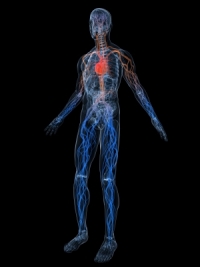We're doomed, say scientists
Sometimes a boring story can become a lot more interesting if you do some skilled number juggling. This is what seems to have happened in an article in The Daily Telegraph, which claims that 90% of us carry a gene which increases the risk of high blood pressure by 18%. And high blood pressure is of course linked to dreaded killers like stroke and heart disease.

In his Understanding Uncertainty blog David Spiegelhalter traces the story back to a paper in Nature Genetics. The authors of the paper investigate three gene variants that can occur in the human genome. Two of them are rare, only about 10% of the population carry them, while the third is present in 90% of the population. The authors show that the gene variants are associated to proteins called natriuretic peptides, which are linked to blood pressure (this is the main point of the paper, since such a genetic connection had never before been found). The two rarer gene variants, according to the paper, reduce the risk of high blood pressure by 15%. The phrase "18% increased risk of high blood pressure" appears nowhere in the paper. Rather it's the result of some creative accounting on the part of someone operating in the media chain which links the actual paper to the final article in The Daily Telegraph. Here's how it's done:
Say that the risk of high blood pressure for someone carrying the more common gene variant is x. Now the 15% decrease associated to the two less common variants takes this down to 0.85x. To get back to x, we need to add 0.15x, and this is exactly 17.647% of 0.85x — hence the claim of an 18% increase in risk.
The calculation is undoubtedly correct, but it puts a spin on the story. Rather than taking the common case as a base line and talking about the risk reduction associated to the less common cases, it does things the other way around. This is in stark contrast to the paper's authors own turn of phrase, which links the rarer variants to risk reduction, but says that the common variant "was not significantly associated with either systolic or diastolic blood pressure." It's a bit like noting that some people live to 110 and then complaining that most of us die prematurely. "This is a masterful piece of re-framing of the evidence," says Spiegelhalter on his blog. "Not exactly wrong, but definitely changing the story. Just like a change from 98% to 96% in a survival rate seems a lot more innocuous than a doubling of the mortality rate from 2% to 4%."
If you'd like to find out more about risk and uncertainty, visit the Understanding Uncertainty website, or read Spiegelhalter's column in Plus.
To find out more about simple number smoke screens, read the Plus article The tiger that isn't.
Labels: Health and medicine
posted by Plus @ 1:01 PM ![]()
![]()